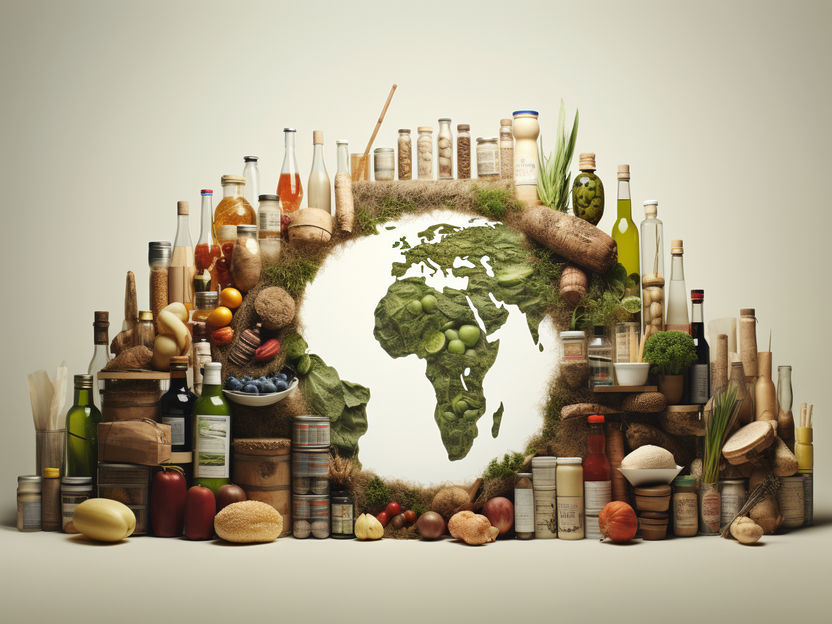Securing global food supply despite EU regulations
Researchers at the University of Bayreuth have compiled information to help political decision-makers better understand the individual options for a new EU-wide regulation of breeding technologies. The aim is to ensure the success of food producers in the EU on the global market. The scientists' findings have now been published in the renowned journal Nature plants and will be incorporated into the current discussion on a draft law by the EU Commission.

symbolic picture
computer generated picture
In July 2023, the European Commission proposed a new regulation on plants bred using certain new genomic techniques (NGT). It is now in the legislative process and is being discussed by members of the EU Parliament and the European Council.
Prof. Dr. Kai Purnhagen, Professor of Food Law at the University of Bayreuth, and his team have analyzed the planned reforms. The researchers recommend focusing on plant traits with sustainability benefits. This is "the best way to contribute to climate protection and the transition to climate neutrality and to integrate sustainability into all food-relevant policy areas without delay", says Purnhagen.
To support decision-making in the legislative process, the team of authors Kai Purnhagen, Yasmin Ambrogio, Alexandra Molitorisova and Alessandro Monaco also present six regulatory options in the article "Options for the regulation of new genomic techniques for plants in the European Union". "New genomic techniques offer great potential, but the possible risks should be managed," says Prof. Purnhagen. "How exactly this should be done is still unclear. We have therefore outlined various options that should now enrich the discussion on the planned law."
The options mentioned in the article are based on regulations in New Zealand, South Africa, Argentina, the USA, Japan and Canada. "We are proposing various regulatory options to regulate the new breeding technologies in such a way that the EU remains present on the global market and in research and the risks remain manageable," says Purnhagen. For this reason, the regulations of other countries and other regulatory areas in the EU were also taken into consideration. "However, our proposals are primarily based on scientific findings. The regulatory options can be used to develop a law that secures the future food supply worldwide and ensures that the EU is not left behind by the global market in terms of food supply."
The Bayreuth research team prepared the paper with research partners from the Federal Office of Consumer Protection and Food Safety, the Plant Breeding Department of the Swedish University of Agricultural Sciences, the NGO Euroseeds, the Agricultural Economics and Rural Policy Group of Wageningen University, the European Technology Platform "Plants for the Future", the Agroecology and Environment Department of Agroscope (Swiss Federal Office for Agriculture), the Faculty of Biology of the University of Latvia and XPRO Consulting Limited.
The project was funded by the Horizon Europe project GeneBEcon "Capturing the potential of Gene editing for a sustainable BioEconomy" and the project of the German Research Foundation (DFG) and the Oberfrankenstiftung (OFS) "Regulating Food Innovation - Technical Innovation requires Regulatory Innovation".
Note: This article has been translated using a computer system without human intervention. LUMITOS offers these automatic translations to present a wider range of current news. Since this article has been translated with automatic translation, it is possible that it contains errors in vocabulary, syntax or grammar. The original article in German can be found here.
Most read news
Topics
Organizations
Other news from the department science

Get the food & beverage industry in your inbox
By submitting this form you agree that LUMITOS AG will send you the newsletter(s) selected above by email. Your data will not be passed on to third parties. Your data will be stored and processed in accordance with our data protection regulations. LUMITOS may contact you by email for the purpose of advertising or market and opinion surveys. You can revoke your consent at any time without giving reasons to LUMITOS AG, Ernst-Augustin-Str. 2, 12489 Berlin, Germany or by e-mail at revoke@lumitos.com with effect for the future. In addition, each email contains a link to unsubscribe from the corresponding newsletter.



























































